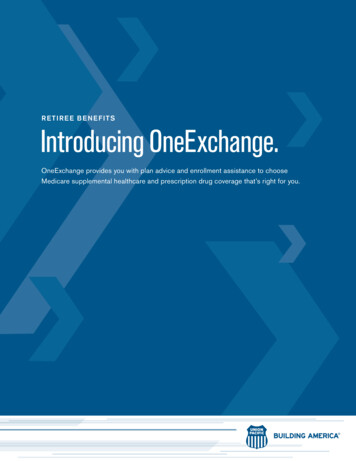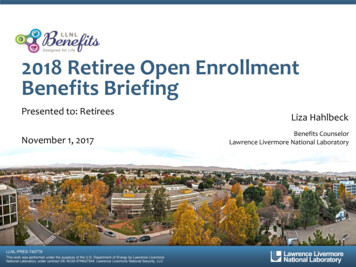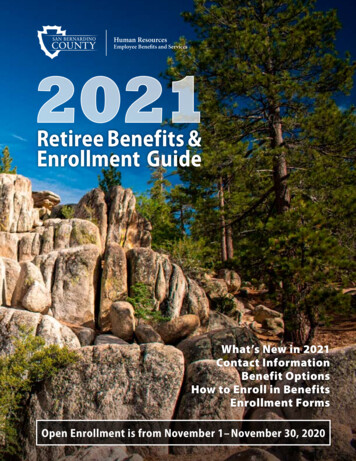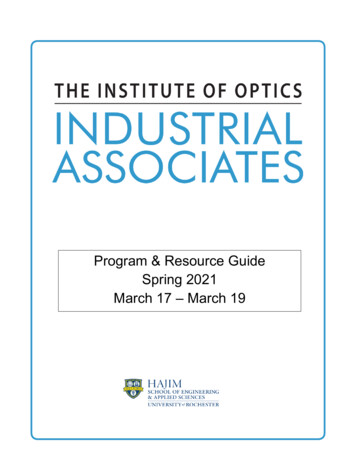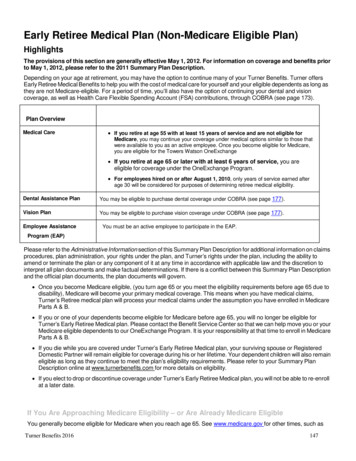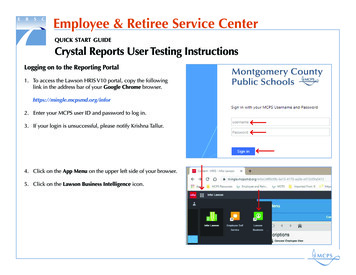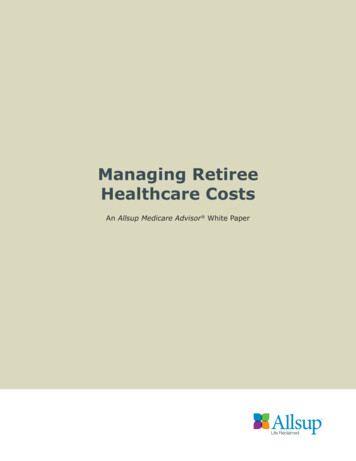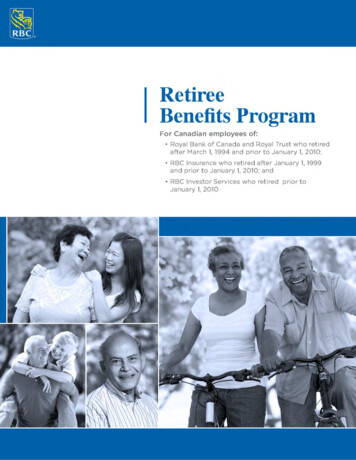
Transcription
Retiree Benefits Program - Post-March 1, 1994This booklet is intended to provide a reasonable and easy-to-understand summary of the mainaspects of the Retiree Benefits Program applicable to eligible Canadian employees of Royal Bankand Royal Trust who retired after March 1, 1994 and prior to January 1, 2010, employees of RBCInsurance who retired after January 1, 1999 and prior to January 1, 2010 and RBC Investor Servicesemployees who retired prior to January 1, 2010.All of the benefits outlined in this booklet are governed by separate governing policies. Every efforthas been made to provide an accurate summary. If there are any differences between theinformation in this booklet and in the governing policies, the governing policies will rule. In no waydoes this booklet create or confer to you any contractual rights or obligations.While it is our intention to offer a benefits program to retirees who qualify, RBC and its subsidiariesreserve the unilateral right to change, amend or terminate in part or in whole its retiree benefitsprogram at any time, including the right to amend the terms and conditions of the various coveragesand to change the amount charged to the individual retirees.June 1, 2017Page 1
Retiree Benefits Program - Post-March 1, 1994WHAT’S INSIDEINTRODUCTION. 3IMPORTANT INFORMATION. 4ELIGIBILITY . 4QUEBEC RESIDENTS. 4COVERING YOUR FAMILY . 4RESIDENCY OUTSIDE OF CANADA . 4ELIGIBLE DEPENDENTS . 4ELIGIBLE CHANGE EVENT (GAINING OR LOSING A DEPENDENT) . 4REDUCING COVERAGE AFTER RETIREMENT. 5BENEFICIARIES . 5CO-ORDINATING CLAIMS . 6CLAIM PAYMENTS AND EXPLANATION OF BENEFITS . 6PREMIUM DEDUCTIONS . 6RETAIL SALES TAX. 6TAX TREATMENT . 6SURVIVOR BENEFITS . 7W HEN COVERAGE ENDS . 7AMENDMENT AND TERMINATION . 7YOUR HEALTHCARE OPTIONS . 8SUPPLEMENTARY MEDICAL PLAN. 8EMERGENCY OUT-OF-PROVINCE/COUNTRY MEDICAL AND TRAVEL ASSISTANCE PLAN . 12PRESCRIPTION DRUG PLAN . 15DENTAL PLAN . 18RETIREE BASIC LIFE INSURANCE . 21ADDITIONAL BENEFITS . 21OPTIONAL LIFE INSURANCE . 21OPTIONAL ACCIDENTAL DEATH & DISMEMBERMENT INSURANCE . 22EMPLOYEECARE PROGRAM. 26SUBMITTING A CLAIM . 27GLOSSARY OF TERMS. 29INFORMATION FOR QUEBEC RESIDENTS. 31RESOURCES – INFORMATION . 33June 1, 2017Page 2
Retiree Benefits Program - Post-March 1, 1994INTRODUCTIONYou were eligible to participate in the Retiree Benefits Program if you met the eligibility criteria set outon page 4.Provincial healthcare plansThe Retiree Benefits Program is designed to supplement your provincial healthcare plan, providing alevel of coverage for many healthcare expenses that are outside of your provincial plan coverage.Provincial healthcare plans typically cover a range of medical items, services and supplies, whichmay include: doctors’ and surgeons’ fees; specialists’ fees when referred by a general practitioner; diagnostic procedures, including X-rays and lab tests; standard ward hospital accommodation; out-patient treatment; and other services and supplies not mentioned above.As the consumer of the service, it remains your responsibility, in consultation with the healthcareprofessional providing the service, to ensure you are aware of applicable provincial limitations.Your provincial healthcare plan is first payerAny services or supplies that are covered by your provincial healthcare plan must first be submitted tothat plan. Any unpaid portion may then be eligible to be paid from the Retiree Benefits Program inaccordance with the provisions of the program. Only eligible expenses are reimbursed in accordancewith the provisions of the Retiree Benefits Program.Under no circumstances, including any misunderstanding of what is an eligible expense, will theadministrator reimburse an ineligible expense. In cases where a portion of an expense is reimbursedby the provincial healthcare plan, provincial legislation may exist that prohibits a private plan fromcovering the portion paid by the individual.Changes to provincial healthcare plans, the introduction of new medical and dental services, or thedevelopment of new prescription drugs will not result in automatic adjustments to the Retiree BenefitsProgram. RBC continually monitors the Retiree Benefits Program to determine what, if any,adjustments are required.RBC reserves the right to amend the Retiree Benefits Program in any respect at any time, includingthe benefits payable to retirees. RBC also reserves the right to terminate the Retiree BenefitsProgram in whole or in part at any time.June 1, 2017Page 3
Retiree Benefits Program - Post-March 1, 1994IMPORTANT INFORMATIONThis booklet contains important information regarding your Retiree Benefits Program coverage andshould be kept in a safe place.EligibilityYou were eligible to participate in the Retiree Benefits Program provided you are: a Royal Bank or Royal Trust employee who retired after March 1, 1994 and prior to January 1, 2010;or an RBC Insurance employee who retired on or after January 1, 1999 and prior to January 1, 2010;or an RBC Investor Services employee who retired prior to January 1, 2010;and you continue to meet the following criteria:o you are residing in Canada and have coverage under a provincial healthcare plan, ando you fulfill the eligibility criteria under this program for coverage to be extended into retirement (asdescribed under the relevant contract/policy), ando you are in receipt of a pension or a retirement allowance, and an employee of Royal Bank orRoyal Trust retired on or after March 1, 1994 andprior to January 1, 2010, an employee of RBCQuebec residentsInsurance who retired on or after January 1, 1999and prior to January 1, 2010 or an employee of RBC For retirees living in Quebec, and below ageInvestor Services who retired prior to January 1,65, the law requires that you select a2010.minimum level of drug coverage for you andyour eligible dependents (i.e., coverage thatIn the event of your death, an eligible survivingis compliant with the Régie de l'assurancespouse/partner and/or eligible dependent child(ren) maymaladie du Québec (RAMQ)), unless youcontinue to participate provided this coverage is in effecthave comparable coverage under anotherprior to your death.plan.Covering your familyBenefit plans are not just about you; they are also about your family. That’s why the Retiree BenefitsProgram allowed you to extend coverage to your eligible dependents (see below) under the availablehealthcare benefit options if you elected Enhanced coverage. There are threelevels of coverage: Retiree only – only you will be covered. Retiree one dependent – you and yourResidency outside of Canadaspouse/partner or one eligible dependent child will becovered.If you take up residence outside of Canada, Retiree two or more dependents – you, yourspouse/partner and/or eligible dependent children will be your Retiree Benefits Program healthcarecoverage, including Emergency Out-ofcovered.Province/Country coverage, will besuspended and your Accidental Death &The level of coverage you selected applies to each of theDismemberment will cancel permanently.available plans – Supplementary Medical, Emergency OutShould you relocate back to Canada at a laterof-Province/Country Medical and Travel Assistance,date, your Retiree Benefits ProgramPrescription Drug and Dental Plans.healthcare coverage will be reinstated uponconfirmation of your provincial healthcare planEligible dependentsparticipation. Your healthcare premium will beAn eligible dependent is any person who qualifies as athe rates in effect at the time of your return.retiree’s spouse/partner or dependent child(ren) as outlinedPlease contact the Human Resourcesin the Glossary of Terms (see pages 29-30).Service Centre at 1-800-545-2555 for detailsandto confirm your date of relocation.Eligible change event (gaining or losing a dependent)You must advise the Human Resources Service Centre inthe event of death, divorce, disqualification of your spouse/partner, or when your child is no longer aneligible dependent so that your coverage and premiums can be adjusted, where applicable.Premiums will continue to be deducted until you advise us of a change. Spouse/partner coverage can be cancelled at any time. Once coverage has been cancelled itcannot be reinstated at a later date. Dependent child coverage can be cancelled at any time. Child coverage may be reinstated at alater date provided your child fulfills the definition of an eligible dependent child.June 1, 2017Page 4
Retiree Benefits Program - Post-March 1, 1994Reducing coverage after retirement Healthcare: you can reduce and/or cancel your coverage at any time. Coverage cannot beincreased. Basic Life Insurance: you can cancel your coverage at any time. Optional Life & Accidental Death & Dismemberment Insurance: you can reduce and/orcancel your coverage at any time. Coverage cannot be increased.In all cases, appropriate documentation is required to be provided to the Human Resources ServiceCentre in order for your change to take effect.Canceled coverage cannot be reinstated at a later date and once coverage is reduced it cannot beincreased. Please contact the Human Resources Service Centre at 1-800-545-2555 for additionalinformation.BeneficiariesThe person or persons you name as your beneficiary (using the Beneficiary Designation Form) willreceive your Basic Life Insurance, Optional Retiree Life Insurance, as well as any Accidental Deathand Dismemberment Insurance (AD&D) if you die as a result of a covered accident. If you have notnamed a beneficiary using the Beneficiary Designation Form, the benefit will be paid to your estate.You are automatically the beneficiary of any Optional Spousal Life Insurance or Optional Child(ren)Life Insurance payable under the Retiree Benefits Program as well as any Accidental Death &Dismemberment (AD&D) Insurance paid on behalf of a covered family member.A Beneficiary Designation Form is available from the RBC pensioners’ website atwww.rbc.com/pensioners/. You can update your beneficiaries at any time by completing a newBeneficiary Designation Form. The Beneficiary Designation Form allows you to designate abeneficiary as revocable or irrevocable.When designating your beneficiary(ies), keep in mind the following:If you appoint multiple beneficiaries If you appoint more than one person as beneficiary for the same benefit, you can specify whatpercentage of the benefit each will receive; however, the total must add up to 100%.If you want to appoint minor beneficiaries If you name a minor beneficiary, they will not have access to any insurance payout until reaching theage of majority – unless you take the necessary legal steps before your death, such as appointing atrustee (except in Quebec) to receive any payment on behalf of any beneficiary during his or herminority for support, maintenance, education and benefit of the minor beneficiary at the discretion ofthe trustee. Those steps vary from province to province.In Quebec, when a death benefit under a life insurance policy is payable to a minor beneficiary, itmust be paid to the parent(s) (or a tutor or curator as defined by the Quebec Civil Code, if applicable),and not to anyone else who might be named as administrator/trustee of the proceeds. Before naminga minor beneficiary, you may wish to seek legal advice.If you live in Quebec and designate your legally married or civil union spouse/partner Under Quebec law, if you designate your legally married or civil union spouse/partner as beneficiary,this designation will be irrevocable unless you specify that it is revocable on the form. If you specifythat a designation is revocable, then you can change your beneficiary at any time without the consentof your spouse/partner. To change an irrevocable designation, you will need the written consent ofyour spouse/partner.June 1, 2017Page 5
Retiree Benefits Program - Post-March 1, 1994Co-ordinating claimsIf you, your spouse/partner, or an eligible dependent are covered under the Retiree Benefits Programand are also covered for similar benefits under another group plan, your expense claims may be coordinated under both plans. Keep in mind, payment from all sources cannot exceed the total of alleligible expenses incurred. Co-ordination of benefits claims will be adjudicated to the eligible(reasonable and customary) amount of the expense and not necessarily the full amount submitted.Co-ordination of benefits applies in situations where your spouse/partner works for, or has also retiredfrom RBC. Sun Life will automatically co-ordinate the claim based on the information provided.To ensure prompt processing of claims, you are required to comply with the following industryprocedures for coordinating claims: When co-ordinating benefits with a spouse/partner’s plan,Claim payments and explanation ofyou must submit claims for yourself through the RetireebenefitsBenefits Program first. Any unpaid personal claims canthen be submitted through your spouse’s or partner’sReimbursement of claims is creditedplan.directly to the bank account from which If you are actively employed (other than at RBC), youyour pre-authorized regular monthlymust first submit claims for you and your coveredpremiums are deducted and/or yourdependents to your employer’s service provider(s). Anypension payments are made. Anunpaid claims can then be submitted through the RetireeExplanation of Benefits (EOB) will beBenefits Program.provided, reflecting both the amount Your spouse/partner must submit personal claims through eligible and the amount reimbursed.his or her benefit plan first. If that plan doesn’t cover theIf you prefer, a “paperless” EOB may befull cost of the service or procedure, you can submit ae-mailed to you once your claim has beenclaim for the remaining expense through the Retireeprocessed.You can register for paperlessBenefits Program.EOBsfromSun Life Member Services, Claims for dependent children are to be submitted first toPaperlessPaymentsat: www.mysunlife.ca.the plan of the parent whose birthday falls earlier in theIfyoudonotregisterforthe paperlessyear. If you were born in March, for example, and youroption,anEOBwillbemailedto the homespouse/partner was born in July, you would submit claimsaddress on your claim form.for dependent children to the Retiree Benefits Programfirst. Again, any uncovered expenses could, in turn, besubmitted to your spouse/partner’s plan as a secondary payer.Claim payments and explanation of benefitsPremium deductionsUnder the Retiree Benefits Program regular monthly premiums will be deducted from your bankaccount through pre-authorized debit and/or your Monthly Pension Payment if you are a member ofthe Defined Benefit option of the RBC Retirement Program. Healthcare and insurance premiums arebased on the coverage selected and the rates in effect. Funds for these deductions must be in yourbank account in order for coverage to be effective. Should no funds be available in your bankaccount, coverage is at risk of being terminated.Retail sales taxIn certain provinces (currently Ontario, Quebec and Manitoba), retail sales tax will be added topremiums paid for Optional Life Insurance and Accidental Death & Dismemberment and deductedfrom your Monthly Pension Payment. Furthermore, if you are a resident of Ontario or Quebec, retailsales tax will also be added to premiums paid for the Healthcare coverage and deducted from yourMonthly Pension Payment.Tax treatmentCurrent legislation requires that you pay income tax on the premiums and retail sales tax (ifapplicable) that RBC pays to provide you with coverage under the Basic Life Insurance Plan. Yourtotal taxable amount for this benefit appears each year on your T4A slip.Quebec residents: refer to page 31 for additional tax treatment information.June 1, 2017Page 6
Retiree Benefits Program - Post-March 1, 1994Survivor benefitsThe Retiree Benefits Program Healthcare plans, (e.g., Supplementary Medical, Emergency Out-ofProvince/Country Medical and Travel Assistance Plan, Prescription Drug and Dental Plans) includethe following survivor benefits.If, at the time of your death, you are participating in the Retiree Benefits Program: your surviving spouse/partner, if already covered under the program, will continue to be eligible forcoverage; and your surviving dependent children, if already covered under the program, will continue to be eligiblefor coverage, until such time as they no longer qualify as a dependent child (refer to page 29 for adefinitio
an RBC Insurance employee who retired on or after January 1, 1999 and prior to January 1, 2010; or an RBC Investor Services employee who retired prior to January 1, 2010; and you continue to meet the following criteria:
